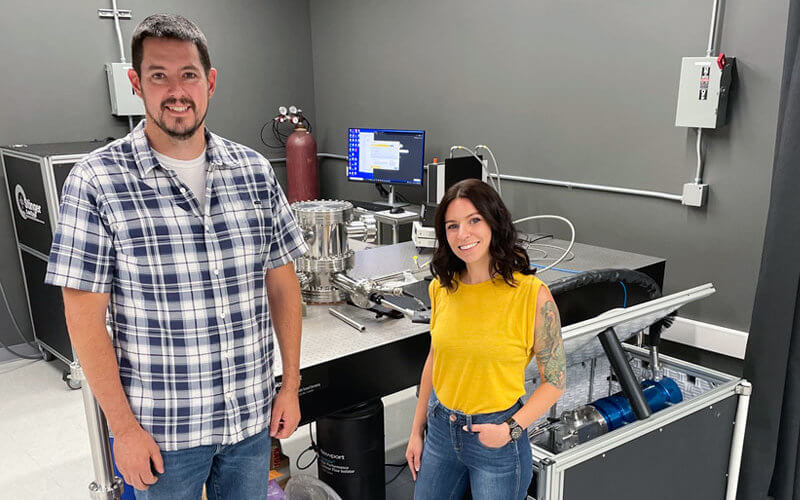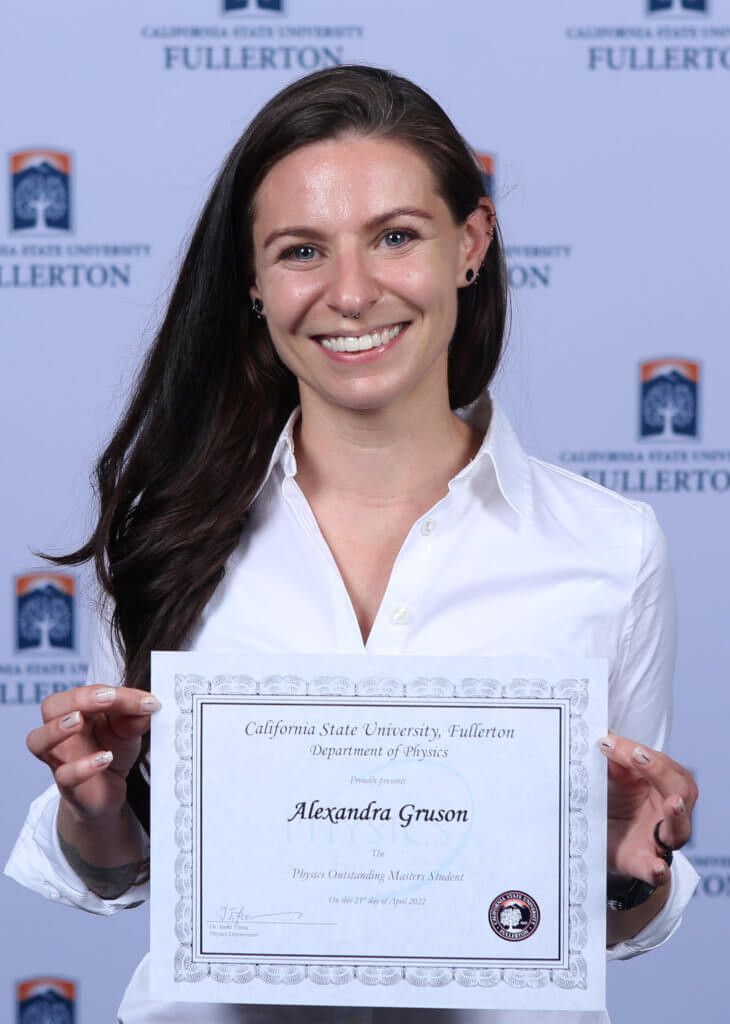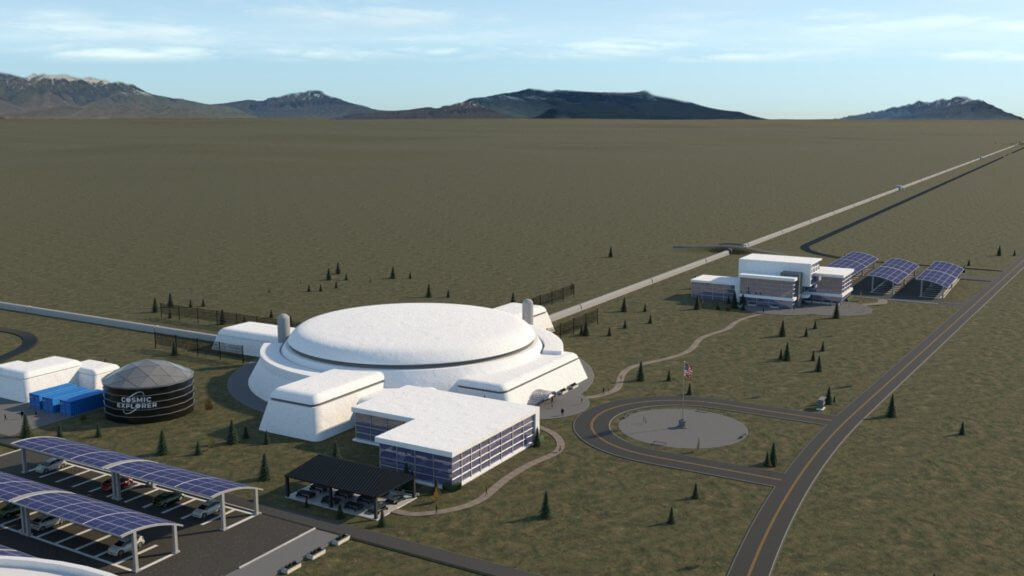
After Alex Gruson graduates next week with a master’s degree in physics from Cal State Fullerton, she is launching her career in the space industry.
“I knew I wanted to enter the space industry after my graduate program, and with a physics background, having real-world applications in research is important for the transition,” Gruson said.
Gruson’s passion for physics and astronomy, combined with pioneering work in CSUF’s gravitational-wave research, helped land her a position at The Aerospace Corporation, an El Segundo-based national nonprofit corporation that operates a federally funded research and development center.
“I recently went through the interview process for positions after I graduate and was lucky enough to have multiple offers to choose from,” said Gruson, who joins the company in June as a remote sensing system modeling and simulation specialist.
“Future employers were aware of my work. It’s clear that my research experience at CSUF prepared me and helped me land a job.”
For the past two years, Gruson has been a graduate research student in the university’s Nicholas and Lee Begovich Center for Gravitational-Wave Physics and Astronomy (GWPAC). She works in the lab of Joshua Smith, professor of physics and Dan Black Director of Gravitational-Wave Physics and Astronomy.

Graduating with a 4.0 GPA, she also is the recipient of the 2022 Physics Outstanding Master’s Candidate Award from the College of Natural Sciences and Mathematics.
Her research involves investigating materials for the highly reflective mirrors used in the Laser Interferometer Gravitational-Wave Observatory (LIGO), which detects gravitational waves from collisions of dense astronomical objects, such as black holes and neutron stars.
Specifically, Gruson has investigated silicon materials at cryogenic temperatures of around -240 degrees Fahrenheit. Under these conditions, silicon has promising optical and mechanical properties making it one of several new technologies being investigated for LIGO observatory upgrades and Cosmic Explorer, the next generation of detectors in the United States, she explained.
“Next-generation gravitational-wave observatories are being developed that will peer deeply into the universe’s dark side, observing remnants of the first stars, conducting a census of stars throughout cosmic time, measuring space-time with unprecedented precision, and opening a wide discovery aperture to the novel and unknown,” Smith said.

Gravitational-wave research allows scientists to observe the universe in a way that was not possible before 2015. The first discovery of gravitational waves was announced by LIGO in 2016, with CSUF physicists — including Smith, Jocelyn Read and Geoffrey Lovelace, and their student researchers — instrumental in the groundbreaking detection.
“This latest research is important because the upcoming LIGO upgrade hopes to increase the number of detections of gravitational waves from one detection every few months to about one detection per hour, and it will greatly expand the range of the detections as well,” Gruson said. “Information gained from gravitational-wave detections can provide endless opportunities to learn more about the universe.”
The CSUF physicists are part of the international team developing Cosmic Explorer, which includes identifying possible sites in the U.S. for observatories. The physicists co-authored the Cosmic Explorer Horizon Study, which envisions the science, technology, partnerships, timeline and cost of the project, Smith relayed.
“This study describes a next-generation ground-based gravitational-wave observatory, with 10 times the sensitivity of Advanced LIGO,” Smith said. “Cosmic Explorer will push gravitational-wave astronomy towards the edge of the observable universe.”
The CSUF team is working to move Cosmic Explorer from the development phase to the design phase. Smith is serving as director of instruments and observatories; Read, associate professor of physics, is the Cosmic Explorer Consortium convener; and Lovelace, professor of physics, is the lead computer scientist.
Gruson, who earned a bachelor’s degree in physics-astrophysics from UC Davis, chose CSUF for her master’s program because of the GWPAC research opportunities.
“This research project allowed me to contribute to a very important large-scale project that supports my passion of astrophysics, while simultaneously giving me the laboratory experience that I was hoping for — and the new skills that will be useful in my next career steps.”
2022 GWPAC Grads
Graduating students earning master’s degrees in physics, and pursing careers in industry or advanced degrees, are:
Erick Engelby — MKS Newport (optics industry)
Alex Gruson — The Aerospace Corporation
Amy Gleckl — Applying for a position in optics industry
Mike Rezac — Air Force research
Mary Usufzy — Applying for a position in data science
Derek White — Attending Chapman University, pursuing doctorate in computational and data sciences
Graduating seniors earning bachelor’s degrees in physics and their plans after graduation are:
Marlo Morales — Washington State University, pursuing doctorate in physics
Noora Ghadiri — University of Illinois, pursuing doctorate in physics
Marc Penuliar — Applying for a position in data science and CSUF certificate program in data science
Daniel Martinez — CSUF master’s program in physics
Cal State Fullerton’s commencement celebrations will take place May 23-26.